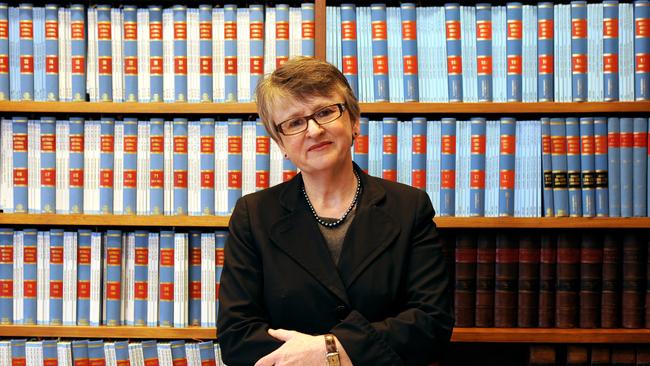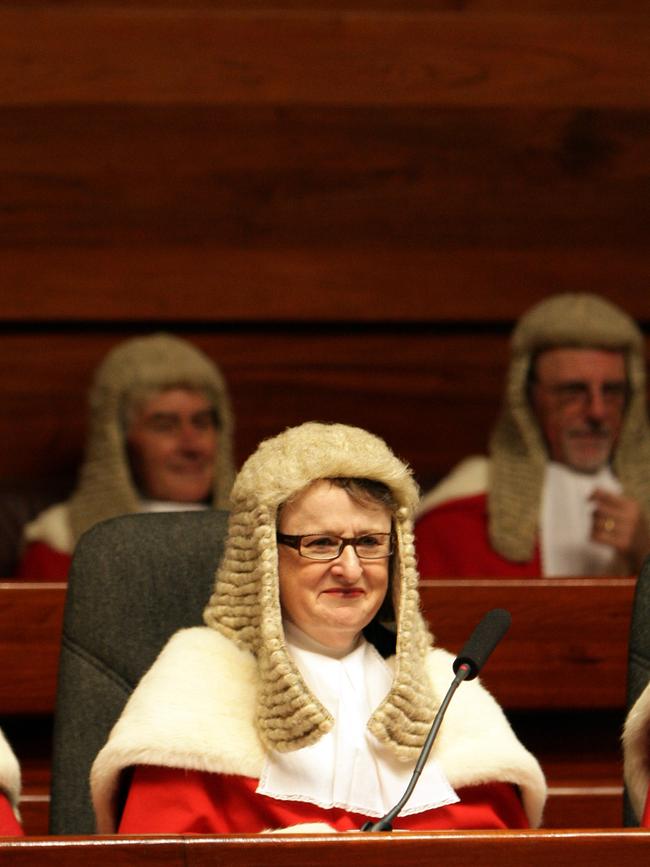Ex-High Court justice Virginia Bell slams judges for allowing ‘inappropriate’ questioning of rape complainants
Former High Court justice Virginia Bell has criticised judges who allow inappropriate defence questioning of rape complainants, out of fear that an intervention from the bench may give rise to an appeal.

Former High Court justice Virginia Bell has criticised judges who allow defence counsel to ask rape complainants inappropriate and belittling questions out of fear an intervention from the bench may give rise to an appeal.
In an emphatic speech amid a Labor-led push to reform sexual violence laws, Ms Bell rejected a proposal for specialist sexual assault courts, saying it would severely disadvantage victims living in rural and regional areas, and impose substantial costs and disruptions on the existing judicial framework.
She accepted there were inherent “frustrations” felt by complainants, but said fundamental principles underpinning the criminal justice system must continue to operate.
“It will always be required, both in chief and likely in cross-examination, to recount unwanted intimate contact to a collection of strangers in a formal setting,” she told the Australian Institute of Judicial Administration conference. “That is likely to be an experience that is embarrassing and distressing, possibly humiliating, even when the evidence is given from a remote location and in the presence of a trusted support person.
“But the prosecution must establish the elements of the offence and the accused, through his legal representative, must have the opportunity to test the evidence.”
Ms Bell’s comments come as the Australian Law Reform Commission conducts a nationwide inquiry into justice responses to sexual violence and looks to overhaul legal frameworks as they relate to rape.
A lived-experience advisory group set up by Attorney-General Mark Dreyfus to provide advice to the ALRC commissioners has pushed for specialist sexual assault courts, to better improve outcomes for complainants.

This proposal has been echoed by various rape advocacies, including Rape and Sexual Assault Research and Advocacy, which, in a submission to the ALRC, said rolling out “pilot” specialist courts to deal with sexual offences could “reduce the harm caused by the systems tasked with protection”.
But Ms Bell poured water over this proposal at the weekend, saying Australia has rightly opted out of adopting specialist courts.
“The Victorian Law Reform Commission considered the question and gave cogent reasons for recommending against the specialist court model,” she said.
“These included the cost and disruption to the existing trial court involved in carving out what is the majority of its work in terms of the criminal work, and the difficulty of rolling out specialised courts throughout the state, leading to what I understand is now described as ‘postcode injustice’.”
Ms Bell said the benefits of a specialist court don’t come “from its status as being a separate court, but from improved case management and quality training”. As such, she called for greater funding and investment in all aspects of the court system to improve the running of criminal processes.
“It’s critical that courts have the resources to bring on the trial of sexual offences promptly,” she said. “A persistent and justified complaint is that delay in the listing of a trial adds to the stress of the complainant, whose life is on hold until the trial is over.”
“I suggest a first-order priority must be adequate funding for the courts and, in the provision of staffing, continuity for the justice sector personnel right through from the investigating police to the officers of the DPP.”
Ms Bell has extensive experience as a public defender, and a solicitor with the Redfern Legal Centre. She was a NSW Court of Appeal judge before being elevated to the High Court in 2009. Most recently, she oversaw an inquiry into former prime minister Scott Morrison’s secret ministries.
Sexual assault advocacies have also urged the Commission to crack down on inappropriate defence questioning of sexual assault complainants when they are in the witness box.

Ms Bell used her speech to criticise judges who exhibited a “reluctance” to use existing provisions under the Evidence Act to stop counsel from asking “sarcastic, combative, belittling, judgmental and repetitive” questions. Drawing on various studies, she suggested some judges may be hesitant to do so, out of fear defence counsel would use an intervention as a ground of appeal.
“While on occasions the High Court and the Court of Criminal Appeal have entertained a ground that contends that improper questions were put to an accused by the prosecutor in cross-examination, I’m not aware of any case in which the disallowance of a question or a line of questions under section 41 has been advanced as a ground of appeal,” she said.
“For nearly 20 years, law has imposed a duty on judges to protect complainants in sexual prosecutions from being subject to that wide range of questions that are disallowable.”




To join the conversation, please log in. Don't have an account? Register
Join the conversation, you are commenting as Logout